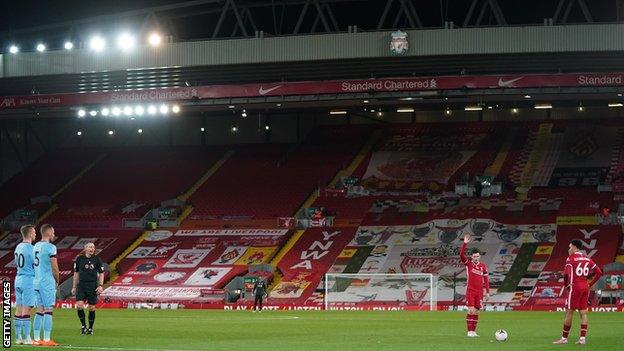Fans return to matches: Government exploring potential return for December
- Published

Fans have not attended Premier League matches since March
The government is exploring the potential for fans to return to sports venues in some parts of England as early as next month.
According to sources, Prime Minister Boris Johnson privately indicated to MPs on Monday that re-opening turnstiles as soon as possible was "a personal priority".
The Department for Digital, Culture, Media and Sport is working on allowing fans into stadia in areas where rates of infections are deemed sufficiently low - possibly before Christmas.
Sports had previously been told to brace themselves for the threat of having no crowds until April.
On Tuesday, the government said it had held "constructive" talks with football leaders on the return of fans, along with issues such as governance reforms, financial sustainability, and greater diversity.
Culture Secretary Oliver Dowden, who hosted a 90-minute 'virtual future of football' summit, said: "I want to work together with football to make progress on important issues for the game's long-term future.
"Discussions to continue as we start our fan-led review of governance."
Any proposals to link access to sports grounds with the tier-system that was in place before the second national lockdown came into force earlier this month, are yet to be finalised or approved by the Cabinet Office.
But officials are known to be increasingly keen to come up with a plan that would enable a phased return of fans in Tier One and possibly Tier Two areas of the country, if the lockdown is lifted, as hoped, in early December.
In a devastating blow to cash-strapped sports bodies, plans for a partial return of spectators from 1 October were scrapped amid a rise in coronavirus cases.
Turnstiles have been closed since March, despite sports insisting that pilot events with socially-distanced crowds have been achieved safely.
There has been further controversy because some arts venues, such as the O2 and Royal Albert Hall, will be allowed to host audiences of up to 5,000 people next month, leading to accusations of inconsistency and favouritism from the sports industry.
Last week during a parliamentary debate on the issue, the government refused to say when it expects spectators to be allowed back inside sports venues in England. Almost 200,000 people have signed petitions calling for fans to be able to return.
However, there are fears that opening stadia could lead to a greater risk of transmission.
"Everyone's saying, 'can I get back to my stadium?'" Sports Minister Nigel Huddleston said last week.
"You times that by multiple levels, leagues and sports, and all of a sudden we've got a whole scale far beyond what is acceptable at this moment in time."
But, in what will come as a major boost to sport, there now seems to have been a shift in approach.
Allow X content?
This article contains content provided by X. We ask for your permission before anything is loaded, as they may be using cookies and other technologies. You may want to read X’s cookie policy, external and privacy policy, external before accepting. To view this content choose ‘accept and continue’.
The Premier League's failure to reach a financial bail-out agreement with the EFL was also discussed at the summit, with ministers known to be increasingly frustrated at the deadlock.
Reform to the system of parachute payments for relegated clubs was mooted at a meeting designed to get the sport's authorities to work together after recent tensions over the potential rescue package and the emergence of radical restructure proposals.

The Players Podcast: Lionesses Steph Houghton and Jill Scott talk leadership
Press X to Continue: Is the new Xbox console worth the money?
